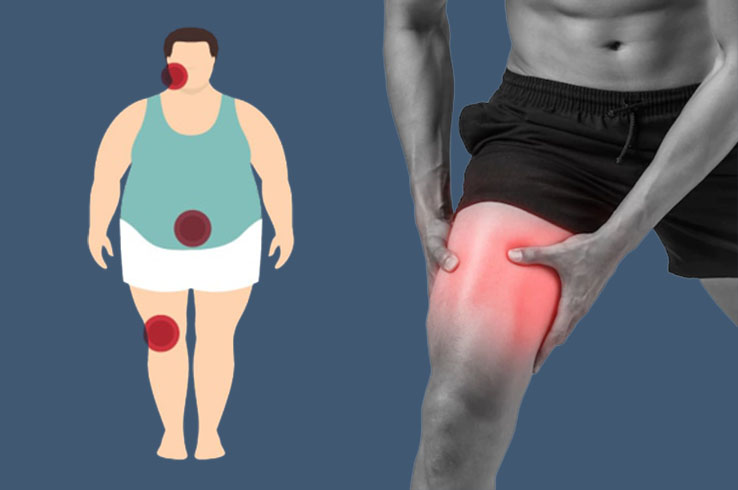Can Being Obesity / Overweight Cause Arthritis
Excess weight puts added stress on joints, particularly knees, causing pain and worsening arthritis damage. “Being just 10 pounds overweight increases the force on your knees by 30 to 40 pounds with every step you take.

Obesity frequently contributes to soft tissue damage and osteoarthritis—a progressive wear- and-tear disease of the joints. The impact of obesity is especially felt in osteoarthritis of the hip and knee joints. Every pound of body weight places four to six pounds of pressure on each knee joint.
Arthritis may cause a decreased ability to exercise or even walk. The lack of activity doesn’t only limit your enjoyment of life — it can cause weight gain. Extra weight may exacerbate OA symptoms, as well as lead to an increased risk of other complications, including: diabetes.
Losing weight cannot repair the damage that’s already been done to your joints by arthritis, but in addition to decreasing your pain, it can also help to slow down the further progression of the disease. Weight loss eases arthritis pain and improves the quality of life of adults living with arthritis, especially if they are overweight or have obesity.
Weight loss can prevent onset of osteoarthritis, relieve symptoms, improve function and increase quality of life and also reduces the risk for OA in women.
It is usually recommended that people with OA who are overweight start by losing about 10% of their body weight. After that, the doctor can decide what the next steps should be.
Losing weight can be difficult when pain and stiffness from arthritic knees keep you from being active and makes it tough to burn calories, but there are still low-impact exercises that can be done to lose weight without hurting your knees.
- Strength Training….
- Water Aerobics. …
- Swimming
- Biking…
- Walking…
- High Intensity Interval Training.
- Yoga…
The basics to losing weight apply to everyone, whether you have arthritis or not: Eat a variety of fruits and veggies and choose whole grains, low-fat dairy, and lean protein. Watch your portions, have regular, balanced meals, and of course, exercise more. But, one rule does not apply for all and any heavy

weight category cannot be treated the same way as the other heavy weight category. Hence its important to grade the disease to ensure the right treatment is done for the right stage of Obesity.
BMI (Body Mass Index) is the measure used to identify the stage of Obesity.
These ranges of BMI are used to describe levels of risk:
- Normal Weight, if BMI less than 25
- Overweight(not obese), if BMI is 25.0 to 29.9.
- Class 1 (low-risk) obesity, if BMI is 30.0 to 34.9.
- Class 2 (moderate-risk) obesity, if BMI is 35.0 to 39.9.
- Class 3 (high-risk) obesity, if BMI is equal to or greater than 40.0.
Obesity can make Knee surgery more challenging. If you or a loved one are overweight or obese and planning to have Knee surgery, you should be aware that excess weight can put you at risk for certain side effects and complications. These can result from the surgery itself, or from the anesthesia you may need during your surgery.
Total knee replacement is safe and reasonably effective in the morbidly obese. However, the results are not comparable with those achieved in nonobese patients, and knee replacement should not be expected to facilitate weight loss.
Says Dr Patil, “If you need total knee or total hip replacement surgery—and your weight is significantly higher than it should be—your doctor may advise you to lose weight before your procedure.”
The chances of a knee replacement are 8 times higher for patients a BMI greater than 30 and 28 times higher for patients with a BMI over 35. Obesity also results in the necessity of knee and hip replacement earlier. For hip replacements, 10 years earlier than the normal population.
Medical practitioners have long advised patients to lose weight before knee surgery. It is advised that patients should achieve at least a Body Mass Index (BMI) of 40 or lower before they undergo surgery. “The risk is too high for a BMI over 40. Joint replacements will perform better with a stronger, leaner body.” Says Dr Atul Patil Chief Knee Replacement Surgeon at Aastha Health Care, Mumbai.
There have been very encouraging reports of Bariatric Surgery before Knee replacement and hip replacement surgery.
Says Bhakti Mange, Chief Nutritionist at Aastha Bariatrics, “When patients have a BMI of less than 30, non surgical methods like diet, lifestyle modification, behaviour therapy, medicines, exercise, gym and yoga etc can be tried for weight loss.” Once BMI goes more than 30 and Obesity sets it, the International guidelines are very clear and Bariatric Surgery is the only option for weight loss.”
Bariatric surgeries are performed by minimal invasive methods called as Laparoscopic Surgery or Key hole surgery. Latest advances have been SILS (Single Incision Laparoscopic Surgery) and Robotic Surgery.
The most commonly performed Bariatric Surgeries are:
- Laparoscopic Sleeve Gastrectomy
- Mini Gastric Bypass
- Gastric Bypass
Says Dr Manish Motwani, Chief Bariatric Surgeon with Aastha Bariatrics -Mumbai, “Bariatric Surgery provides long term weight loss and major weight loss. There is improvement in life span and quality of life. There is massive improvement in medical comorbidities and in case of Osteoarthritis, there is tremendous reduction in Knee and hip pain. If major damage has not happened to the knee joint because of Obesity, in majority of patients, knee replacement can be avoided or may be atleast postponed by many years.”
Read also; The Cost of Bariatric Surgery in India
Medically reviewed by Dr. Manish Motwani, Bariatric & Metabolic Laparoscopic Bariatric Surgeon — Written by Divya Patel
Related Post



